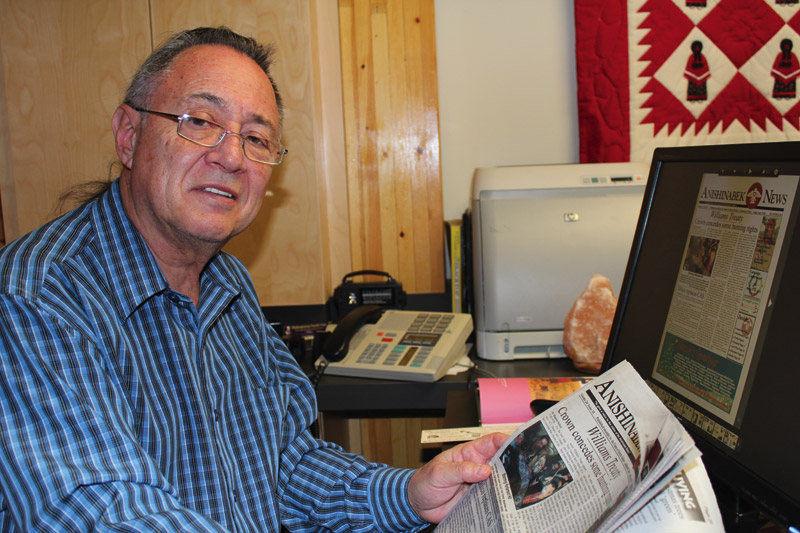What Stephen Harper didn’t learn in school
 By Maurice Switzer
By Maurice Switzer
We are what we learn.
What we hear from our teachers, copy from blackboards, and cram from our textbooks helps shape the beings we will become.
This makes it crucial that societies that ensure their children are well and properly taught. Providing learners the right curriculum is the best investment we can make in their futures.
In September, 1973, Stephen Joseph Harper began his high school studies at Richview Collegiate Institute in Etobicoke. He is remembered by classmates and teachers as a bright and “geeky” lad who joined the Young Liberals club and worshiped Prime Minister Pierre Trudeau.
Earlier that year, the Supreme Court of Canada had issued a landmark decision in the Calder Case, ruling that Aboriginal title did, indeed, exist at the time of the Royal Proclamation of 1763. It was now the law in Canada that King George III was absolutely correct in decreeing that “the Indian tribes of North America” were to be respected as “Nations”, with “inviolate” land rights.
Stephen Harper was not taught this in school. In fact 40 years later many Canadian students are not being taught this in school. Some of them are still being taught that North American Indians got here after crossing the Bering Strait between Siberia and Alaska when it was frozen over 13,000 years ago. And some Canadian students are being taught that the earth was created 5,000 years ago, like it says in the small print in the margins of their Bible.
Young Stephen was taught a lot of things he accepted as gospel truth – that there were nine planets, and about 90 elements in chemistry’s Periodic Table. Scientists subsequently amended these “truths”.
In 1973 Stephen Harper’s education was in its infancy. He had no way of knowing that a black baseball player named Henry Aaron would break Babe Ruth’s cherished home run record, or that the first international space station would remain in orbit for six years.
He couldn’t envision that Pauline McGibbon would become the first female Lieutenant Governor of a Canadian province, of that the Royal Canadian Mounted Police would admit women to their ranks.
And he certainly couldn’t imagine that one day he would become Canada’s 22nd Prime Minister.
Political leaders aren’t expected to have crystal balls – to know who is going to win the Stanley Cup, or make the latest scientific breakthrough, or win the next election. And it’s natural that part of their maturing process can involve a shift in perspectives, a changing of minds – it’s safe to say that Stephen Harper no longer idolizes Pierre Elliott Trudeau, whose son Justin is now trying to take his job.
But they are supposed to remember lessons that history has taught us, and certainly have a good grasp of the rule of law.
Stephen Harper acts like someone completely oblivious to Canadian laws, as they represent the interests and respect the rights of First Peoples. Section 35 of the very Constitution he is sworn to uphold provides constitutional protection to the aboriginal and treaty rights of Aboriginal Peoples in Canada.
In spite of this Canadian legal cornerstone, numerous Supreme Court decisions and such international protocols as the United Nations Declaration on the Rights of Indigenous Peoples, the Harper Conservatives have rammed through legislation that smacks of the still-in-force 1876 Indian Act, whose terms include a provision requiring Natives to get federal permission to sell wooden carvings.
It may be relevant that Stephen Harper is the first Canadian Prime Minister since Joe Clark who does not possess a law degree. Harper is an economist, and his government’s legislative focus is on making money, specifically, doing so by providing easy corporate access to natural resources located on traditional First Nations territories without involving the landowners any say in the process. His party favours pipelines to lifelines.
To make First Nations more amenable to his government’s economic agenda, Harper has launched what some leaders call a legislative assault on their legally-recognized rights, including an attempt to impose a First Nations Education Act that would entrench unequal funding and dictated standards in First Nations schools.
The act would ensure that students attending these schools would not be taught their own languages, history, and culture by the most qualified teachers in classrooms of the same standards as enjoyed by other Canadians.
They would not learn about the 1973 Calder Decision, or the implications of the Royal Proclamation.
In other words, their education would have the same shortcomings that were received by Stephen Joseph Harper.
Maurice Switzer is a citizen of the Mississaugas of Alderville First Nation. He serves as director of communications for the Union of Ontario Indians and editor of the Anishinabek News.


